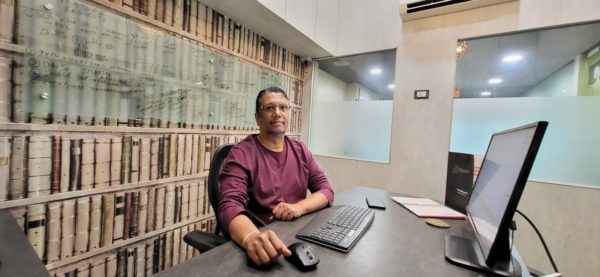By Khwaish Jain | IMAWS
The world relies on the logistics industry – the unseen force that keeps goods flowing and shelves stocked. However, this essential sector has a reputation for being slow to embrace new technologies. Nishith Rastogi, Founder & CEO, Locus.sh, in this special interaction, delves into the hurdles that hinder innovation in logistics, the skills needed to thrive in this evolving field, and how some companies are overcoming these challenges with fresh ideas and a focus on employee well-being.
Q1. The logistics industry is traditionally known for being slow to adopt new technologies. What are some of the biggest hurdles to innovation in logistics, and how can startups help overcome them?
In the logistics sector, resistance to digital transformation from stakeholders on the ground makes change management a common challenge. As a technology company serving the logistics industry, Locus resolves this challenge head-on with a comprehensive change management strategy. This includes multiple in-person workshops and training sessions during the implementation phase to build confidence in using our technology.
By demystifying technology through hands-on experience and real-time problem-solving, we highlight its tangible benefits. Our round-the-clock support further minimizes disruptions, ensuring a smooth transition and fostering a positive attitude towards digital transformation. This approach not only facilitates the adoption of innovative solutions, but also helps our clients ensure greater efficiency, sustainability, and customer satisfaction.
Q2. Logistics often faces a shortage of skilled workers, particularly for tech-enabled roles. What are some of the specific skills that are in high demand in the logistics technology sector?
The logistics technology sector demands a blend of technical and soft skills. Technically, expertise in data analytics, artificial intelligence, machine learning, and secure, scalable software development is crucial. Soft skills, such as adaptability, problem-solving, project management, and effective communication in a fast-paced environment, complement this technical knowledge. An in-depth understanding of logistics and supply chain processes is essential for creating practical, industry-aligned technological solutions.
Q3. Locus is known for its innovation. Can you give an example of a recent project or initiative where this culture led to a breakthrough solution for the logistics industry?
All of our offerings have been developed keeping in mind innovation to drive key business outcomes. Recently, we focussed on the issue of customer convenience with the online shopping experience. Two of the top reasons for cart abandonment when shopping online are long and complicated checkout processes and slow delivery timelines. To that end, we had a breakthrough with Delivery Linked Checkouts. This solution provides multiple convenient delivery options right at the time of checkout, which simplifies the process and increases convenience for the end customer and is also seamlessly connected with on-ground operations for greater efficiency.
Another recent breakthrough solution is ShipFlex. Many businesses do not have their fleet and when they do, they find themselves in a capacity crunch, especially during the peak seasons. This is where businesses have to rely on third-party carriers, but this in itself is a challenge. They have to go through a long process of sourcing quotations from various vendors and negotiating back and forth before finally selecting a carrier. ShipFlex is a solution that simplifies third-party carrier selection by shortlisting the right carriers at the right price and service levels according to the requirements of each business.
For close to a decade, we have worked with leading enterprises and accumulated deep insights into the nature of logistics, particularly the last mile, which is said to be one of the most expensive legs of fulfilment.
We felt that sharing these insights would allow businesses to improve the maturity of last-mile operations across multiple markets and use cases. To that end, another recent breakthrough project by Locus is introducing an industry-first Last-Mile Maturity Assessment tool. The Assessment tool was developed to help businesses across various sectors evaluate their current last-mile logistics performance and identify areas for improvement, offering them a clear path toward optimizing their logistics operations for increased efficiency, customer satisfaction, and sustainability in the form of customized reports. By engaging over 100 businesses across diverse sectors in taking the assessment, we gathered a wealth of industry-level and regional insights.
Q4. How does Locus balance the need for innovation with the practicalities of serving clients in a highly regulated industry like logistics?
While innovation is one of our key values at Locus, we pursue innovation not simply for innovation’s sake, but to drive tangible business outcomes for our clients and stakeholders. This is why, when we start innovating on new offerings, we treat regulations not as a hindrance or an obstacle, but as a necessary framework in which our solutions can take shape. For example, our platform is GDPR compliant and comes with role-based access control as it is necessary for ensuring that sensitive information stays safe and is only accessed on a need-to-know basis.
In fact, some of the most prominent regulations in our line of expertise are related to data privacy and security. With a presence in 30+ countries and a dedicated team of Information Security professionals, our commitment to trust and security is fundamental, especially when serving leading enterprises globally.
Our operational model emphasizes a shared security responsibility, where we maintain the security of our product and infrastructure, offering customers reliable security features while expecting them to manage their security settings in line with their requirements. Locus’s ISO 27001:2013 and ISO 27701:2019 certifications underscore our capability to safeguard customer data and personal information, reflecting our adherence to stringent information security and privacy practices. Through these measures, we not only support our clients in meeting their compliance requirements but also foster a secure and trustworthy environment that facilitates the adoption of innovative logistics solutions.
Q5. Employee turnover in the logistics sector is often high. What strategies can startups in the logistics industry implement to create a more positive and engaging work environment for employees?
We believe that one of the key reasons for high turnover is when they are not motivated or engaged enough with the work they do. In our experience, team members are the most motivated and engaged when they get to work on problems that are challenging without being overwhelming, and which create real-world impact. This is why, over the years, Locus’s unique culture seeks to maximize engagement by underpinning it on values such as Ambition, Pride, Commitment, Innovation, Integrity, Bias for Action, and Frugality.
Central to this culture are initiatives like our annual hackathon, which not only showcases our commitment to innovation but also reinforces teamwork and creative problem-solving. We also place a strong emphasis on personal and professional growth through mentorship programs and continuous learning opportunities. Finally, recognizing individual achievements and providing clear pathways for career advancement are crucial methods we employ to ensure our team members feel valued, seen, and motivated to grow with us. These efforts collectively contribute to a work environment that fosters engagement, loyalty, and a shared sense of purpose, all of which improve employee engagement and significantly reduce turnover rates.
Q6. Locus prioritizes employee well-being. Can you describe a specific program or policy that has been particularly effective in boosting employee morale and productivity within the logistics environment?
At Locus, prioritizing employee well-being is central to our culture. A standout initiative that exemplifies our commitment to fostering a positive and healthy work environment is our annual Sports Day. This event is designed to encourage team bonding, physical health, and a spirit of friendly competition among our employees. By stepping away from the daily routine and engaging in various sports activities, our team members not only enjoy a fun and energizing day but also strengthen their connections with colleagues across different departments.
This initiative, along with others focused on mental and physical health, has been particularly effective in boosting morale and productivity. Through such initiatives, Locus demonstrates a commitment to creating a work environment where employee well-being is a priority, contributing significantly to our overall success and the delivery of exceptional service to our clients.
Q7. Many startups struggle to offer competitive salaries. Does Locus leverage its innovative culture and its focus on employee well-being to differentiate itself from established players when recruiting talent?
At Locus, our approach to employee well-being is holistic and multifaceted, designed to support not just the professional but the personal lives of our team members. Central to our well-being initiatives are regular one-on-one check-ins, ensuring open communication and a supportive environment for all employees. We complement this with inclusive insurance policies that address a wide range of health and wellness needs, providing peace of mind and comprehensive coverage for our team and their families.
We believe that we attract ambitious team members, and who wish to leverage their talents to build or create meaningful impact. Often, what is needed is the right environment for them to catalyze their skills. This is where trust plays a big role. To that end, we don’t have policies, but processes to help our team make the best use of their discretion, their time, and energy. One example of this is our unlimited leaves policy: We allow team members to manage their leaves, knowing full well they will ensure their work will be taken care of accordingly.
Additionally, our open-door policy with the founders fosters a culture of transparency and trust, allowing every team member to feel connected and valued at the highest levels of the organization.
Further enriching our workplace are the regular events designed to strengthen team bonds and promote a sense of belonging, from our celebrated annual Sports Day to various team-building activities and social gatherings. These initiatives not only enhance the social fabric of our workplace but also encourage a lively, engaging, and supportive atmosphere that is crucial for fostering innovation. By prioritizing these aspects of well-being, Locus is not just a technology company in the logistics space; we’re a community where employees feel genuinely invested in and enthusiastic about the work we do and the culture we’ve built.













